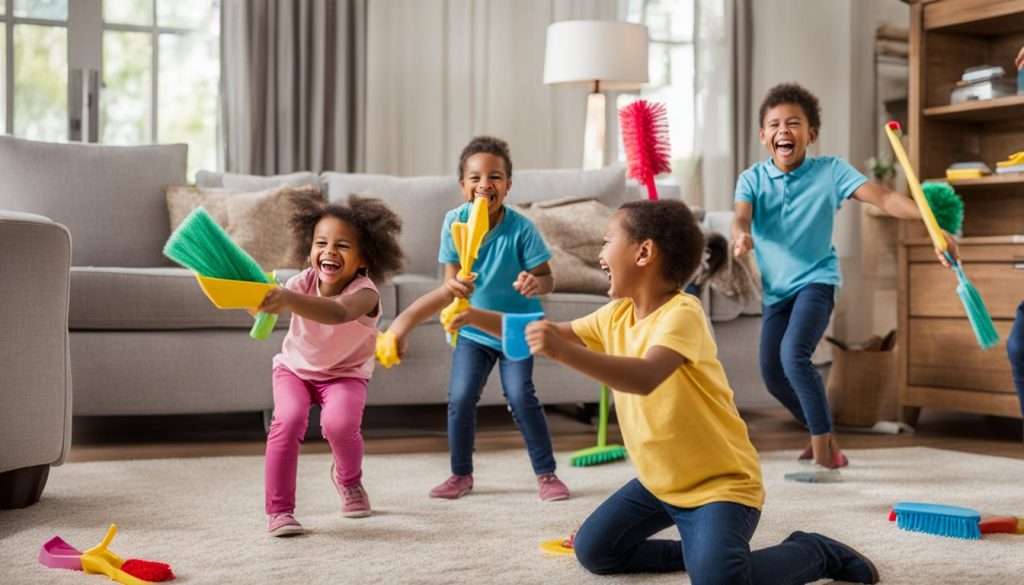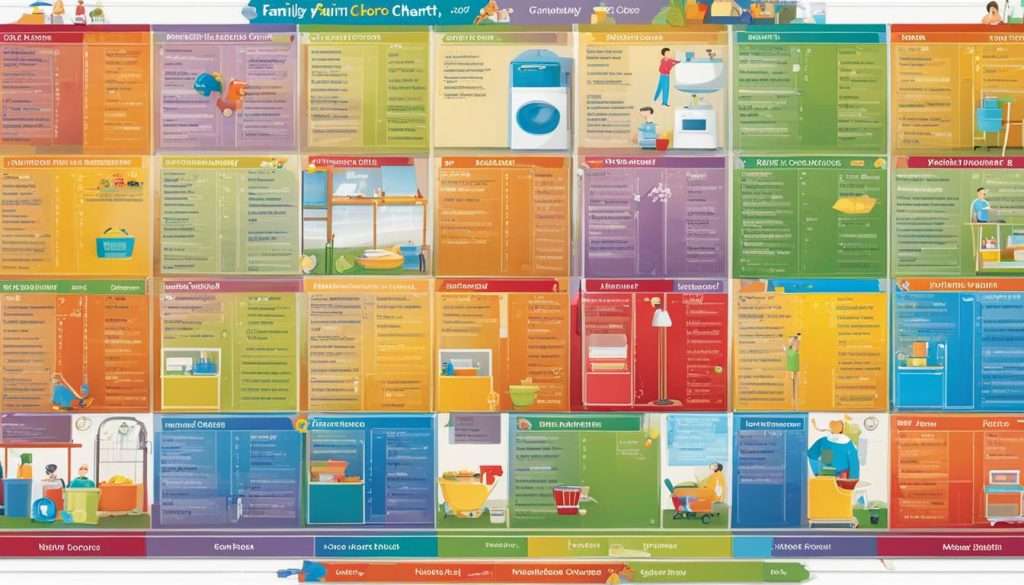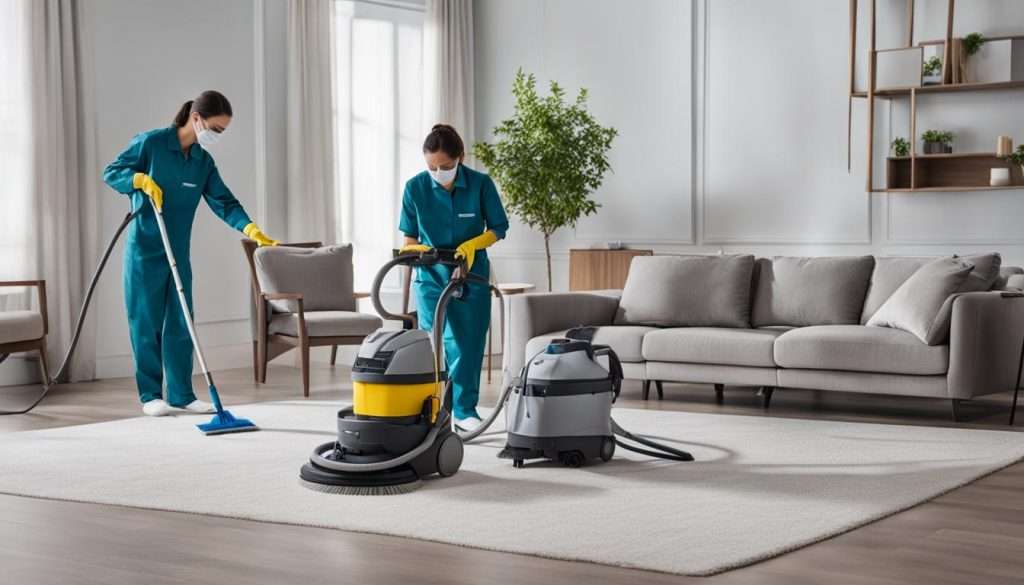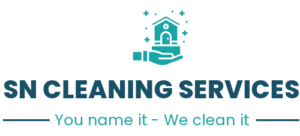When it comes to maintaining a clean and organized home, involving the entire family in cleaning chores is essential. Not only does it lighten the load for one person, but it also fosters a cooperative environment where everyone shares the responsibility. In this article, we will explore effective strategies to encourage family members, including children and spouses, to participate in cleaning tasks.
Key Takeaways:
- Getting the whole family involved in cleaning chores creates a cooperative environment.
- Making cleaning fun for children can help motivate their participation.
- Setting clear rules and expectations ensures accountability for everyone.
- Creating a chore list helps distribute tasks among family members.
- Scheduling dedicated cleaning times encourages teamwork.
Make Cleaning Fun for Children
Getting children involved in cleaning chores can sometimes be a challenge. However, by making cleaning fun and engaging, you can encourage their participation and create a positive environment. Here are some tips to make cleaning enjoyable for kids:
1. Turn Cleaning into a Game
One effective way to make cleaning fun for children is to turn it into a game. You can create a scavenger hunt where they have to find and clean specific items, or you can set a timer and challenge them to clean as much as they can before it goes off. By adding an element of competition and excitement, cleaning becomes a fun activity that kids will look forward to.
2. Play Music or Sing Along
Listening to music or singing along while cleaning can make the task more enjoyable for children. Create a cleaning playlist with their favorite songs or sing catchy tunes together while tidying up. The upbeat music will create a positive atmosphere and make the cleaning process feel less like a chore.
3. Use Colorful Cleaning Supplies
Children are often attracted to bright colors and fun designs. Provide them with colorful cleaning supplies such as gloves, sponges, and spray bottles. This will make the cleaning process more visually appealing and exciting for kids. You can even let them choose their own cleaning tools to personalize their cleaning experience.

By implementing these strategies, you can involve kids in cleaning and make it a fun and interactive activity. Remember to praise and reward their efforts, as positive reinforcement will further motivate them to participate in household chores. With a bit of creativity and enthusiasm, cleaning can become an enjoyable experience for the whole family.
Set Clear Rules and Expectations
Establishing clear rules and expectations is essential for ensuring that everyone in the family contributes to cleaning chores. By setting guidelines and holding each family member accountable, you create a structured approach that promotes responsibility and cooperation. Here are some rules that can be established for children and spouses:
Rules for Children
- Assign age-appropriate tasks: Determine specific cleaning tasks that are suitable for each child’s age and capabilities.
- Set a schedule: Establish a regular cleaning schedule for children to follow, whether it’s daily, weekly, or monthly.
- Reward system: Implement a reward system to incentivize children to complete their cleaning tasks, such as earning points or small rewards for a job well done.
- Lead by example: Show children how to properly clean and maintain a tidy space by demonstrating the tasks yourself.
Rules for Spouses
- Shared responsibility: Make it clear that maintaining a clean home is a joint effort and that both spouses have an equal role in cleaning.
- Communicate expectations: Discuss and agree upon the specific cleaning tasks and the frequency at which they should be completed.
- Rotate responsibilities: Avoid assigning the same tasks to one spouse all the time by rotating the cleaning responsibilities.
- Express appreciation: Show gratitude and acknowledge each other’s efforts to create a positive and supportive environment.
By setting clear rules and expectations for cleaning, you establish a framework that ensures everyone understands their role and contributes to maintaining a clean and organized home.
Create a Chore List
When it comes to keeping your home clean and organized, creating a chore list can be a game-changer. A chore list helps allocate tasks among family members, ensuring that everyone has a role to play in maintaining a clean environment. Here are some tips for creating an effective chore list:
- Assign age-appropriate tasks: Tailor the chores to each family member’s abilities and age. Younger children can be responsible for simple tasks like picking up toys, while older kids can handle more complex tasks like vacuuming or doing the laundry.
- Rotate responsibilities: Switching up chores on a weekly or monthly basis prevents boredom and gives everyone a chance to learn different skills. It also promotes fairness and prevents one person from getting stuck with the same tasks all the time.
- Set realistic expectations: Ensure that the tasks assigned are manageable within everyone’s schedule and abilities. It’s important to strike a balance between challenging and achievable tasks to maintain motivation and prevent burnout.
By creating a chore list, you are establishing a sense of accountability within the family. Having defined responsibilities ensures that each family member understands their role in maintaining a clean and organized home.

| Chore | Assigned To | Frequency |
|---|---|---|
| Washing dishes | Sarah | Every day |
| Taking out the trash | John | Every other day |
| Dusting furniture | Emma | Once a week |
| Mopping the floors | Michael | Once a week |
Table: Sample Chore List
Remember, the chore list is not meant to be a source of conflict or punishment. It should be viewed as a tool to promote teamwork, responsibility, and a clean living environment for the whole family. Regularly communicate with your family members, acknowledge their efforts, and make adjustments to the chore list as needed to ensure its effectiveness.
Schedule Cleaning Times
Setting aside dedicated cleaning times can make the cleaning process more manageable and encourage family members to work together. By establishing a regular cleaning schedule, you can ensure that everyone in the family knows when it’s time to pitch in and lend a hand. Here are some tips for scheduling cleaning times:
Create a Weekly Cleaning Calendar
Develop a weekly cleaning calendar that outlines specific cleaning tasks for each day of the week. This will help ensure that all areas of the house are cleaned regularly and that no tasks are overlooked. Assign different tasks to family members based on their age and capabilities, and rotate responsibilities to keep things fair.
Set Realistic Timeframes
Be realistic about the time needed to complete each cleaning task and allocate sufficient time for each activity. Avoid cramming too many tasks into one cleaning session, as this can lead to stress and frustration. Instead, spread out the tasks throughout the week so that they can be completed effectively.
Work as a Team
Cleaning as a family can foster a sense of teamwork and cooperation. Encourage family members to work together on tasks that require more than one person, such as moving heavy furniture or deep cleaning certain areas. This not only makes the cleaning process more efficient but also promotes bonding and a sense of shared responsibility.
| Benefits of Scheduled Cleaning Times | Tips for Successful Implementation |
|---|---|
| 1. Provides a structured approach to cleaning | 1. Involve all family members in the scheduling process |
| 2. Helps maintain a consistently clean and organized home | 2. Use visual reminders, such as a whiteboard or calendar, to keep track of cleaning schedules |
| 3. Reduces procrastination and ensures tasks are completed regularly | 3. Be flexible and adjust the schedule as needed to accommodate family activities or unforeseen events |
Seek Professional Cleaning Help
When it comes to maintaining a clean and organized home, sometimes the workload can become overwhelming, leading to tension and arguments within the family. Seeking professional cleaning help can be a practical solution to this problem. Professional cleaning services, such as maid services, can offer a range of benefits that not only reduce family arguments but also ensure a clean and comfortable living environment for everyone.
One of the key advantages of hiring professional cleaning services is the expertise and experience they bring to the table. Professional cleaners are trained to efficiently and effectively clean all areas of the home, utilizing the right tools, techniques, and cleaning products. This ensures that every nook and cranny receives thorough attention, resulting in a spotless home that meets high cleanliness standards.
By outsourcing the cleaning responsibilities to professionals, families can also save time and energy. Instead of spending hours each week on strenuous cleaning tasks, family members can focus on other important aspects of their lives, such as work, school, or quality time spent together. This not only reduces stress but also improves overall well-being and promotes a healthier work-life balance.
| Benefits of Professional Cleaning Services |
|---|
| Saves time and energy |
| Professional expertise and experience |
| Consistent high-quality cleaning |
| Customized cleaning plans |
| Reduced family arguments |

Furthermore, professional cleaning services can offer customized cleaning plans to suit the specific needs and preferences of each family. Whether it’s a one-time deep clean or recurring scheduled cleanings, these services can be tailored to accommodate individual requirements. This flexibility ensures that families can create a cleaning schedule that fits seamlessly into their lifestyles, without any disruptions.
Lastly, by hiring professional cleaners, families can significantly reduce conflicts and arguments related to cleaning responsibilities. With professionals taking care of the cleaning tasks, there is no room for blame or dissatisfaction. Instead, family members can enjoy a clean and organized home without the stress of having to allocate and monitor cleaning duties. This promotes a harmonious environment where everyone can focus on enjoying their time together.
Model a Positive Attitude Towards Cleaning
When it comes to getting the whole family involved in cleaning chores, it is essential to model a positive attitude towards cleaning. By leading by example, you can inspire your family members to embrace their cleaning responsibilities and make it an enjoyable activity. Here are some tips to help you create a positive atmosphere around cleaning:
1. Show appreciation for a job well done:
Recognize and acknowledge the efforts of your family members when they contribute to cleaning. Expressing gratitude and offering words of encouragement can go a long way in reinforcing positive behavior and motivation. Consider implementing a rewards system, such as small treats or privileges, to further incentivize a job well done.
2. Make cleaning a fun and interactive experience:
Engage your family members in cleaning activities by turning them into enjoyable tasks. Play music, have cleaning challenges, or create friendly competitions to add a sense of excitement and engagement. By making cleaning a fun and interactive experience, you can foster a positive attitude and make it a bonding time for the whole family.
3. Break tasks into manageable chunks:
Large cleaning tasks can sometimes feel overwhelming for family members, especially children. Break down tasks into smaller, more manageable chunks to prevent frustration and maintain motivation. By dividing tasks into smaller portions, you can ensure that everyone feels a sense of accomplishment as they complete each step.
By modeling a positive attitude towards cleaning, you can create a cooperative environment where every family member understands the importance of maintaining a clean and organized living space. Leading by example, showing appreciation, and making cleaning a fun experience can go a long way in encouraging active participation and instilling a sense of responsibility in your family members.
| Benefits of a Positive Attitude Towards Cleaning |
|---|
| 1. Increased motivation and willingness to participate in cleaning chores. |
| 2. Enhanced cooperation and teamwork within the family. |
| 3. Reduced arguments and stress related to cleaning responsibilities. |
| 4. Improved cleanliness and organization of the living space. |
| 5. Positive impact on children’s long-term habits and attitudes towards cleanliness. |
Reduce Clutter
Keeping your home clean and organized requires reducing clutter. Clutter not only makes cleaning more difficult, but it can also create trip hazards and make your space feel chaotic. Here are some effective tips to help you reduce clutter and maintain a clean and organized living environment:
- Declutter regularly: Set aside time each week to go through your belongings and remove items you no longer need or use. Consider donating or selling them to free up space.
- Create designated storage spaces: Assign specific areas or containers for different items. This will help prevent items from accumulating in random places and make it easier to find things when you need them.
- Minimize paper clutter: Go digital whenever possible by opting for online statements, receipts, and documents. Use a filing system or digital organization tools to keep important papers organized.
- Invest in storage solutions: Use storage bins, shelves, and organizers to maximize space and keep items neatly arranged. Utilize vertical space in closets and cabinets to make the most of your storage options.
- Practice the “one in, one out” rule: When you bring a new item into your home, make a conscious effort to remove something similar that you no longer need. This will help prevent unnecessary accumulation.
By implementing these strategies, you’ll be able to reduce clutter and create a clean, organized, and visually appealing living space. Remember, a clutter-free environment not only makes cleaning easier but also promotes a sense of calm and tranquility in your home.
| Benefits of Reducing Clutter | Effects of Clutter |
|---|---|
| Improved focus and productivity | Increased stress and anxiety |
| Enhanced visual aesthetics | Difficulty finding and accessing items |
| Easier cleaning and maintenance | Reduced functionality of space |
| Less time spent searching for things | Potential trip hazards |
Enroll the Whole Family in Decision-Making
When it comes to maintaining cleanliness in the household, involving the whole family in decision-making is crucial. By engaging in discussions about cleanliness standards, a mutual agreement can be reached, promoting shared responsibility among family members.
Start by gathering the family together for a discussion on cleanliness. Encourage everyone to express their thoughts and ideas on how to maintain a clean and tidy home. This open dialogue allows for a collective understanding of each family member’s expectations and preferences.
During the conversation, establish a set of cleanliness standards that everyone agrees upon. This can include guidelines for tidying personal spaces, organizing shared areas, and practicing good hygiene habits. By involving the whole family in creating these standards, a sense of ownership and accountability is fostered.
Remember, the key to successful family decision-making is to maintain a respectful and inclusive atmosphere. Encourage compromise and consider individual capabilities and limitations when setting cleanliness goals. By enrolling the whole family in decision-making, a harmonious and clean living environment can be achieved.
